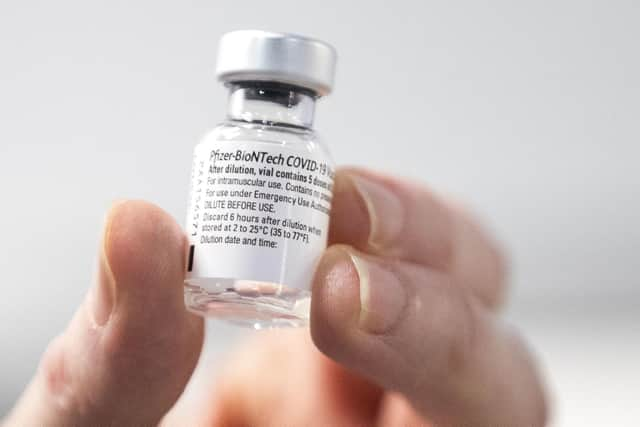Vaccines 'offer high levels of protection against Indian variant' of coronavirus study reveals
Both the Pfizer and AstraZeneca jabs were found to be almost as effective against symptomatic disease from the B1617.2 strain as they are against the Kent variant after the second dose.
However, they were only 33 per cent effective three weeks after the first dose.
Advertisement
Hide AdAdvertisement
Hide AdHealth Secretary Matt Hancock described the outcome as "groundbreaking", while PHE said it expects to see even higher levels of effectiveness against hospital admission and death.
The study, which took place between April 5 and May 16, found that the Pfizer vaccine was 88 per cent effective against symptomatic disease from the Indian variant two weeks after the second dose, compared with 93 per cent effectiveness against the Kent strain.
Meanwhile, the AstraZeneca jab was 60 per cent effective, compared with 66 per cent against the Kent variant over the same period.
Both vaccines were 33 per cent effective against symptomatic disease from the Indian variant three weeks after the first dose, compared with about 50 per cent against the Kent strain.
Some 12,675 genome-sequenced cases were included in the analysis, but only 1,054 were of the Indian variant.


The study included data for all age groups from April 5 to cover the period since the strain emerged.
New data from PHE shows there have been at least 2,889 cases of the Indian variant recorded in England from February 1 this year to May 18.
Of those, 104 cases resulted in a visit to a hospital emergency department, 31 required an overnight hospital admission and six resulted in a death.
Advertisement
Hide AdAdvertisement
Hide AdThe most common strain in England, according to the data, is the Kent variant, with 132,082 cases recorded over the same period.
Some 1,569 people have died with the variant, while 2,011 cases resulted in an overnight hospital admission and 5,238 required a visit to a hospital emergency department.
Dr Jamie Lopez Bernal, consultant medical epidemiologist at PHE and the study's lead author, said there was more confidence in the data from the first vaccine dose compared with that from the second.
He told journalists on Saturday: "There are bigger numbers that have been vaccinated with one dose. So I think we classify that as moderate certainty around the first dose, but low levels of confidence around the second dose."
However, Professor Susan Hopkins, PHE's Covid-19 strategic response director, said the data trend was "quite clear" and was heading in the "right direction".
PHE said the difference in the effectiveness between the vaccines may be due to the AstraZeneca second dose being rolled out later than the Pfizer vaccine.
Data also shows it takes longer for the AstraZeneca jab to reach maximum effectiveness.
Mr Hancock said: "This new evidence is groundbreaking and proves just how valuable our Covid-19 vaccination programme is in protecting the people we love.
Advertisement
Hide AdAdvertisement
Hide Ad"We can now be confident that over 20 million people - more than one in three - have significant protection against this new variant, and that number is growing by the hundreds of thousands every single day as more and more people get that vital second dose."
